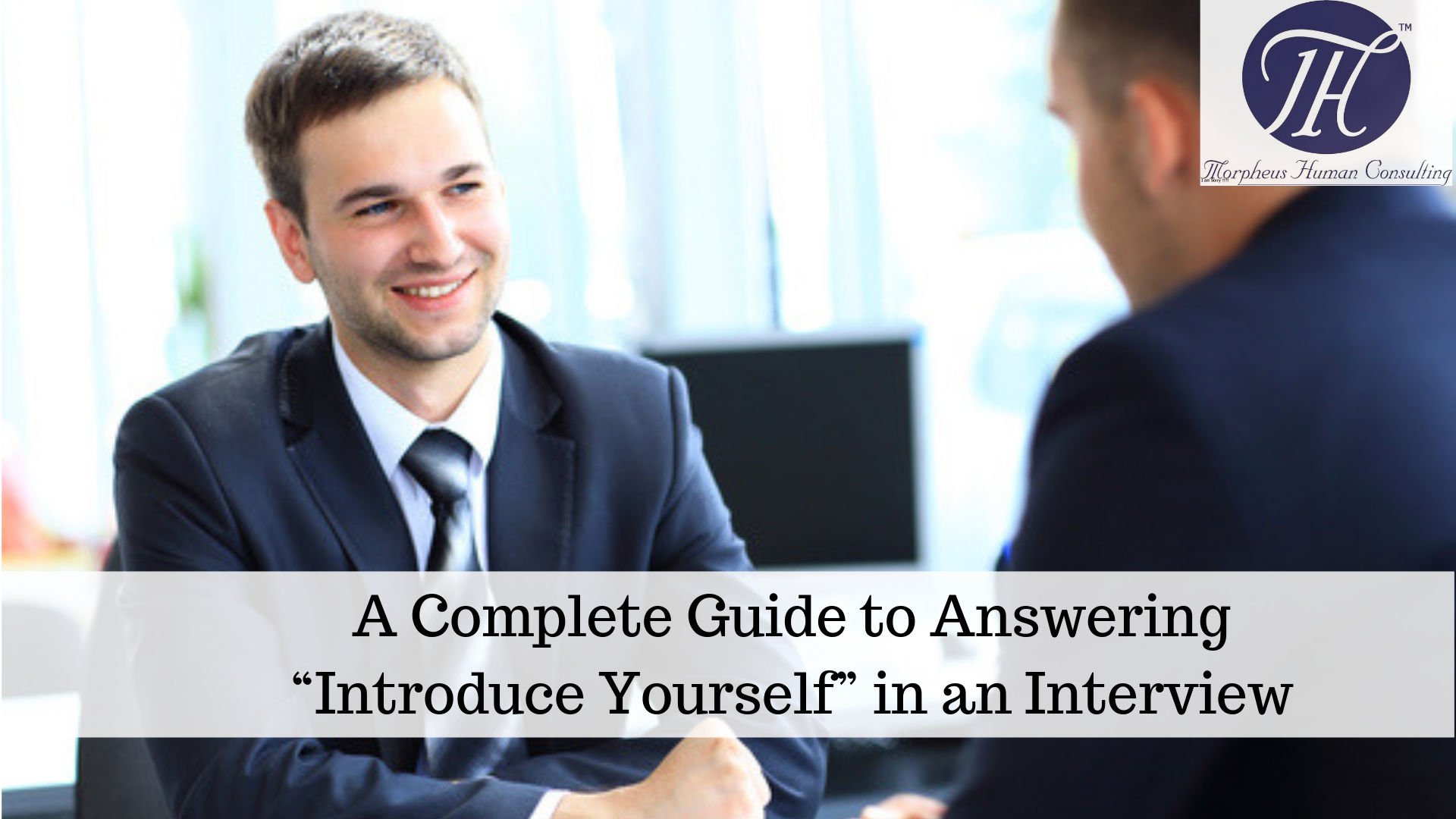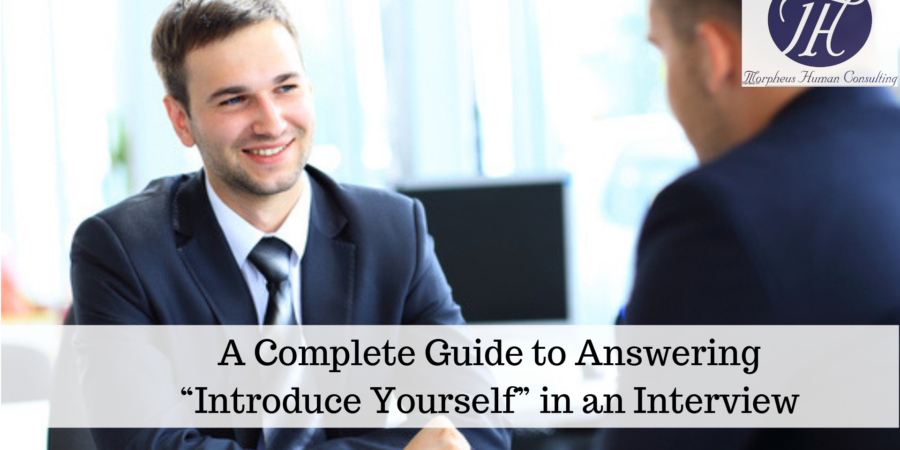A Complete Guide to Answering “Introduce Yourself” in an Interview

Even though it’s one of the most common interview questions, “it almost always stumps them,” Merrill says. It might seem like an easy win—after all, you know all about yourself!—but responding to this invitation to talk about you in the context of a job interview can feel stressful and complicated. “It’s challenging because it is broad, open-ended,” Merrill points out. You might be thinking: Um, what do you want to know? How am I supposed to pick what to share out of my entire life story right now? Luckily, you can prepare in advance and use this common opening prompt to your advantage, setting the stage for a successful interview.
Why Interviewers Ask It
Beyond serving as an icebreaker and transition, Dea says, this introductory question also helps recruiters and hiring managers to accomplish what’s often one of their major goals in the hiring process: getting to know you. If you answer it well, the interviewers will begin to find out why you’re the best candidate for this job, in terms of hard skills and experience as well as soft skills. It’s a great opportunity to demonstrate that you can communicate clearly and effectively, connect with and react to other humans, and present yourself professionally. There are plenty of times when you’ll hear these exact words: “Tell me about yourself.” But interviewers might have their own versions of the prompt that are asking pretty much the same thing, including:
- I have your resume in front of me but tell me more about yourself.
- Walk me through your experiences.
- I’d love to hear more about your journey.
- Tell me a little bit more about your background.
A Simple Formula for Answering “Tell Me About Yourself”
A simple and effective formula for structuring your response: present, past, future.
- Present: Talk a little bit about what your current role is, the scope of it, and perhaps a big recent accomplishment.
- Past: Tell the interviewer how you got there and/or mention a previous experience that’s relevant to the job and company you’re applying for.
- Future: Segue into what you’re looking to do next and why you’re interested in this gig (and a great fit for it, too).
This isn’t the only way to build your response, of course, and you can tweak it as you see fit. If there’s a particularly potent story about what brought you into this field, for example, you might decide to start with that “past” story and then get into what you’re doing in the present. Whatever order you pick, make sure you ultimately tie it to the job and company. “A good place to end it is to give a transition of this is why I’m here,” Dea says. You want to be absolutely certain your interviewer is left with the impression that it “makes sense that [you’re] sitting here talking to me about this role.”
8 More Tips for Answering “Tell Me About Yourself”
Okay, so you’ve got an interview coming up and you know it’s probably going to start with some form of “tell me about yourself.” Here’s what else you need to do to nail your answer.
1. Tailor Your Answer to the Role and Company
Take advantage of the opportunity! In order to do that, you’ll want to spend some time combing through the job description, researching the company, and figuring out how you can tell your story in a way that makes it crystal clear why you’re interested and what you bring to the table that aligns with the role and company.
For example, a client he worked with was leaving a job where she’d worked on a team developing a new antibacterial cream and getting it ready for clinical trials. The new job she wanted entailed working on an entirely unrelated product, so the important thing for her to mention in this case was that prior to her current role, she’d never had experience working on antibacterial creams and was able to come in and figure out how to move the process forward, just as she could do in this new role.
So when you’re in the midst of a job search looking for a particular type of role, you might have a basic template you use for every interview, but make sure to tweak it to fit the company. “It’s an opportunity to show them right away that you get it,” Campos says. “If they talk a lot about the culture, weave that into your answer,” she adds, and if the company or even the particular team emphasizes something else, see if you can incorporate that. In some cases, individual keywords could help give the cue that you’ve done your research and are a good fit, according to Campos. For example, does the company refer to itself a tech company or a startup, a consumer brand or an online retailer, a publication or zine?
2. Keep It, Professional
In keeping with the notion that this question carries an invisible addendum—“as it’s relevant to this role and company”—you’re best off keeping your answer professional. Wascovich explains that whereas the norm in some countries might be to share personal details at this point, in the U.S. you should avoid doing so. In other words, this isn’t the time to talk about your family and hobbies, unless you know something very specific about the company that would lead you to believe otherwise.
3. But Inject Some Passion Into Your Answer (if You Feel Comfortable)
Keeping your answer professional, however, shouldn’t stop you from shedding light on why you’re passionate about your work or about this company, even if that broaches slightly more personal territory. You don’t have to go into a huge amount of detail, but if your goal in an interview is to stand out among the applicant pool and be memorable, then infusing this answer with some passion can help you do that.
4. Be Succinct (and Definitely, Don’t Recite Your Resume)
Whatever you do, don’t waste this time regurgitating every single detail of your career. “Most people answer it like they’re giving a dissertation on their resume,” says Davis, but that’s only going to bore the interviewer to tears. It’s not just about entertaining or engaging your interviewer, Campos explains. You’re also giving a hint as to how you’ll speak in meetings with co-workers, bosses, and clients. Are you going to ramble for 10 minutes every time someone asks you a somewhat open-ended question? There’s no scientifically proven optimal length for answering this or any interview question. Some coaches and recruiters will tell you to keep it to 30 seconds or less, while others will say you should aim for a minute, or talk for no more than two minutes.
“Everyone has a different approach,” says Dea, who’s had candidates speak for one minute or go on for five. But in his experience, people tend to start losing steam after 1.5 to 2.5 minutes of uninterrupted talking. You’ll have to decide what feels right for you in any given context, but if you’re speaking for longer than a couple of minutes, there’s a good chance you’re getting into too much detail too soon.
Make sure you’re also reading the room as you’re talking. If the other person looks bored or distracted, it might be time to wrap it up. If they perk up at one part of your answer, it might be worth expanding on that topic a bit more.
In general, however, remember that you don’t have to relay your entire life story here, Dea says. Think of it as a teaser that should pique the interviewer’s interest and give them a chance to ask follow-up questions about whatever intrigues them most.
5. Practice (But Don’t Memorize)
You don’t want to wait until you get this question in a live interview to try out your answer for the first time. Think through what you want to convey about yourself ahead of each interview and practice saying it out loud. If you can, go beyond practising solo. “It always helps to practice with other people to hear yourself say it and hear feedback from how other people are interpreting what you’re saying,” Dea says. Asking a trusted colleague, friend, or family member to listen and react to your answer will help you hone it. If your practice buddy is game, you can even ask them what they would say if they were being asked, and try to put yourself in the interviewer’s shoes to think about what you’d look for on the other side.
Practice will surely make your answer stronger and help you become more confident in giving it. Dea warns, however, against memorizing and reciting your spiel word-for-word. “There’s a fine balance between practising and memorizing. It needs to come off as very authentic,” he says.
6. Know Your Audience
As with any interview question—or conversation for that matter—you’ll want to make sure you understand who you’re talking to. You might get some form of “tell me about yourself” at every single stage of the interview process for a job, from the phone screen through final rounds, but that doesn’t mean you have to give the same exact answer every time.
If you’re speaking to a recruiter who’s not immersed in the hard skills of the team you’d be joining, you might keep your answer more focused on the bigger picture, whereas when you speak to your prospective boss, you might get a little bit more technical. If you’re talking to a C-level executive as part of your final round, it’s probably smart to touch on why you’re drawn to the overall mission of the company they run. You can also enhance your answer and make it more specific to the role and company based on what you learn as you progress through the interview process, Campos says, such as, “When I talked to so-and-so it really resonated with me that your mission or value is…”
7. Keep It Positive
If you were fired or laid off from your last job, this probably isn’t the best moment to mention it. “There are a time and place for everything—you don’t have to cram it all into this answer,” Campos says. “If you view this as your first impression professionally, give them a window into that but don’t give them everything. The conversation’s not ready for that.” As you move further into an interview, things get more comfortable. So wait until you get a specific question about why you’re looking to change jobs or why you have a gap on your resume to address those topics.
And that advice you’ve probably heard a million times about not badmouthing your previous employer? That applies here, too. Especially here. If the first thing you tell an interviewer is how awful your boss is and you’re trying to escape the misery of their micromanaging clutches, that’s a big turnoff.
8. Remember This Is Often Your First Impression, and It Matters
Even if the powers that be aren’t making an irreversible determination shortly after the conversation begins, a first impression can colour the rest of the interview. If you have to spend the rest of the time making up for a bad opening, you’re in a very different position than if you gave a succinct, confident, and relevant answer right off the bat.
